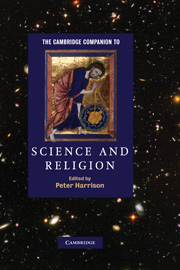Book contents
- Frontmatter
- Introduction
- Part I Historical interactions
- 1 The fate of science in patristic and medieval Christendom
- 2 Religion and the Scientific Revolution
- 3 Natural theology and the sciences
- 4 Religious reactions to Darwin
- 5 Science and secularization
- Part II Religion and contemporary science
- Part III Philosophical perspectives
- A guide to further reading
- Index
3 - Natural theology and the sciences
from Part I - Historical interactions
Published online by Cambridge University Press: 28 July 2010
- Frontmatter
- Introduction
- Part I Historical interactions
- 1 The fate of science in patristic and medieval Christendom
- 2 Religion and the Scientific Revolution
- 3 Natural theology and the sciences
- 4 Religious reactions to Darwin
- 5 Science and secularization
- Part II Religion and contemporary science
- Part III Philosophical perspectives
- A guide to further reading
- Index
Summary
Historians of science have often emphasized the importance of natural theology in the development of modern science, invoking it in explanations of such diverse phenomena as the rapid spread of Newtonianism in Britain and the development of Charles Darwin's evolutionary theorizing. However, since the meaning of the term is not as transparent as might at first appear, it will be helpful to begin with some clarificatory remarks. A relatively stable definition of natural theology has prevailed among theologically informed writers, at least since the early modern era. This definition is nicely characterized in a British encyclopaedia of the 1840s, which describes natural theology as a theological system framed 'entirely out of the religious truths which may be learned from natural sources, that is, from the constitution of the human mind, and from the phenomena of the mental and material universe'. Thus defined, natural theology is a type of theology which relies on reason (which is natural), unaided by any evidence derived from God's revelation through scriptures, miracles or prophecies (which is supernatural). On this basis, the appropriate contrast for natural theology is revealed theology; it is the source of the theological knowledge that is natural, not its object. Such a definition is in broad agreement both with that offered by Francis Bacon in 1605 and with that offered by philosopher of religion Richard Swinburne in 2005, and it is the one that will be viewed here as having been generally normative in the modern era.
- Type
- Chapter
- Information
- The Cambridge Companion to Science and Religion , pp. 59 - 79Publisher: Cambridge University PressPrint publication year: 2010
- 9
- Cited by



